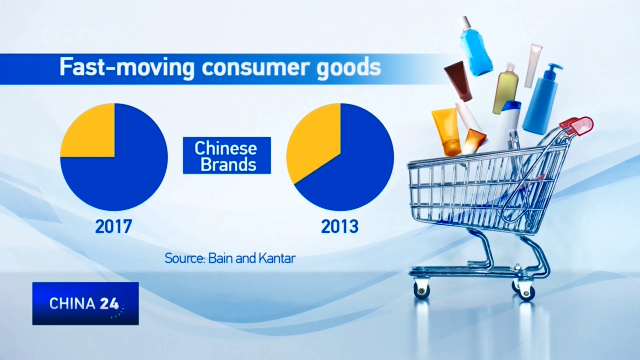
20:54, 07-Jul-2018
Losing Market Share: Trade war could exacerbate slippage
Updated
20:28, 10-Jul-2018
02:17

Trade war or not, Chinese companies are already reining in American brands. According to a recent report, popular household names in the States -- such as Apple, Starbucks and Procter & Gamble's Pampers -- are already seeing their dominance challenged, a potential threat to the huge revenue streams American firms see in China.
US brands have long enjoyed a vaunted status in China. American fast food, beverage and coffee chains are everywhere, while consumers lap up their infant formula, designer jeans, cars and smartphones. That dominance, however, is beginning to wane.
BRUNO LANNES SHANGHAI-BASED PARTNER WITH BAIN & CO "The local brands have been gaining share and this is becoming a very big concern of multi-national brands because it has to do with the way they compete and the way they are applying the playbook which doesn't seem to be fitting with what the market requires and they have a lot to learn from the local companies."
According to the consultancy, last year, local brands snatched almost three-quarters of China's 96-billion-dollar-market for fast-moving consumer goods - a category that includes items like soft drinks and shampoo - up from two-thirds in 2013.
The brewing trade tensions could exacerbate this slippage.
MS. LI STARBUCKS CUSTOMER "If there's a trade conflict between China and the U.S., and it affects the national interests, certainly we will boycott some foreign brands and ask friends and family to safeguard our nation's interests."
But what may be an even bigger threat: local rivals armed with innovative products. Tea brand Heytea sells its product with cream cheese foam that has attracted long queues all across the country.
LI YONGQI 30-YEAR-OLD "Drinks of Chinese brands are perhaps a bit cheaper than American brands. I'm willing to support local brands if the quality and price of American and Chinese products are roughly the same as it can help promote local brands. I think it's pretty good."
And there is also a blessing from the Chinese consumer.
JIA TIANYOU 32-YEAR-OLD "I think we are seeing Chinese brands replacing American ones."
WQW, CGTN

SITEMAP
Copyright © 2018 CGTN. Beijing ICP prepared NO.16065310-3
Copyright © 2018 CGTN. Beijing ICP prepared NO.16065310-3